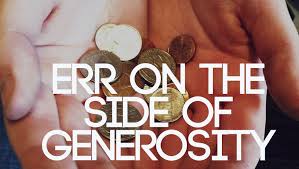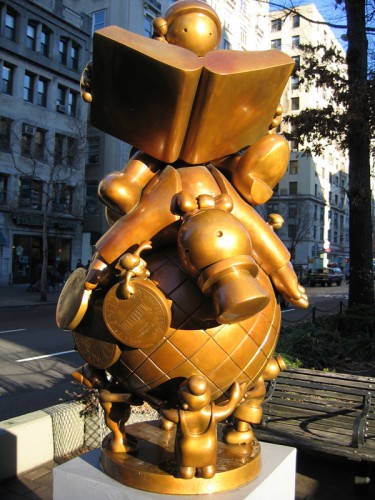Money, money, money
Must be funny
In a rich man’s world
Money, money, money
Always sunny
In a rich man’s world
Aha-ahaaa
All the things I could do
If I had a little money
It’s a rich man’s world
It’s a rich man’s world
(lyrics from Money Money in Mamma Mia)
Who does not spend time, in an agony of soul, over the bills, the needs, the desires, the dreams, the limits, of money? And whose money agonies do not have prayer mixed in them?
Even Bernie Madoff, most evil steward of other people’s money and an imago of Mammon, has to have had bouts of agony, in the early days as he was stepping away into the dark world of Ponzi scheming as well as nowadays, in his prison cell.
Rich and poor, money has a way of bringing us all to our knees. Any bed can become a prison of terror as we face our money fears. We glimpse the shadow shape of that terror in brief statistics: most Americans have no savings for old age; forty nine percent of American children live in homes with incomes below the poverty line; the elderly sometimes choose between food and heat, between food and rent.
 In his movie, Blue Jasmine, Woody Allen tells the tale of Jeanette, who has been the wife of a man like Madoff, and now is struggling to survive without money, after his fall. She staggers through other worlds, clinging to her delusion that she can still live in the world to which she no longer has any access. Jeanette is wholly focused on finding a way back to the world of money. And we sorrow with her, for everything she had, all her relationships, intimate and casual, all her activities, from cocktails to shopping, were dependent on her money. Without money, everything is gone, for nothing was really hers, everything belonged to the money. The film follows her descent into terror as her delusions fall away.
In his movie, Blue Jasmine, Woody Allen tells the tale of Jeanette, who has been the wife of a man like Madoff, and now is struggling to survive without money, after his fall. She staggers through other worlds, clinging to her delusion that she can still live in the world to which she no longer has any access. Jeanette is wholly focused on finding a way back to the world of money. And we sorrow with her, for everything she had, all her relationships, intimate and casual, all her activities, from cocktails to shopping, were dependent on her money. Without money, everything is gone, for nothing was really hers, everything belonged to the money. The film follows her descent into terror as her delusions fall away.
In his gospel, Luke tells a tale Jesus told, one of many about money, which strips away our delusions about our ability to manage money and be true to God at the same time. There was a dishonest manager, Jesus says. (Right away Jesus has our attention.) The manager has been cooking the books, squandering his employer’s money. And then the employer finds out about it, is angry, and gives him his notice. A few weeks and he will be out of a job.
What am I going to do now, the manager asks, in terror, in prayer, and in longing to survive. I’m too old to do manual labor, and no one will hire me to be a manager again. He’s out of options.  But then he decides to reverse his schemes, change whom he serves. He spends the time he has left re-cooking the books, slashing everyone’s debts by half or more. He calls in the debt-ridden poor, and they arrive with pinched faces and fearful hearts, ready to beg for more time, but they leave in tears of joy as the manager erases with a stroke of his pen debts that would have taken years of toil and sacrifice to fulfill. He has blessed their lives — figuring, when he is out of a job, they will be generous to him and help him survive. What a guy, huh?
But then he decides to reverse his schemes, change whom he serves. He spends the time he has left re-cooking the books, slashing everyone’s debts by half or more. He calls in the debt-ridden poor, and they arrive with pinched faces and fearful hearts, ready to beg for more time, but they leave in tears of joy as the manager erases with a stroke of his pen debts that would have taken years of toil and sacrifice to fulfill. He has blessed their lives — figuring, when he is out of a job, they will be generous to him and help him survive. What a guy, huh?
 Now here’s the kicker: Jesus says the employer (who is always God in Jesus’ stories) praises the man for doing this, calls him a good servant, saying he and those like him (children of this age, is Luke’s term) are wiser in dealing with their generation than are the pious and prayerful (children of light is Luke’s term).
Now here’s the kicker: Jesus says the employer (who is always God in Jesus’ stories) praises the man for doing this, calls him a good servant, saying he and those like him (children of this age, is Luke’s term) are wiser in dealing with their generation than are the pious and prayerful (children of light is Luke’s term).
And I know this to be true: for each time this story comes round, those in the pews are appalled, cannot find any sense in this, cannot move from the fact that this manager is a crook, to the wisdom of Jesus, that the moral thing is to serve the poor, to be generous where it is in your power to be generous, and whatever gets you to do, and whatever means you use, when you are generous to those in need, you are worthy of praise.
 My own heart shrinks from this man, even after years of hearing his story. And I know this is my problem, not his. His story is St. Francis of Assisi’s story, who came to see himself as a spoiled rich kid, and then emptied his father’s warehouse of costly goods to help the poor (his father, who had been away when it happened, was enraged). And this is Robin Hood’s story, taking from the rich to give to the poor. Among us, there is a St. Francis’ reaction at times: when the media report some tragic loss, a handicapped van stolen from a family with a disabled child, or a motorized wheelchair hit by a car, or thirty six people maimed in the Marathon bombings, then the rest of us respond, bringing forth money from our own lives, which are always a mix of good and evil, to meet these human needs. Some sixty million has been raised for the bombing victims, much of it from people whose hearts swing both ways, toward Mammon and toward God.
My own heart shrinks from this man, even after years of hearing his story. And I know this is my problem, not his. His story is St. Francis of Assisi’s story, who came to see himself as a spoiled rich kid, and then emptied his father’s warehouse of costly goods to help the poor (his father, who had been away when it happened, was enraged). And this is Robin Hood’s story, taking from the rich to give to the poor. Among us, there is a St. Francis’ reaction at times: when the media report some tragic loss, a handicapped van stolen from a family with a disabled child, or a motorized wheelchair hit by a car, or thirty six people maimed in the Marathon bombings, then the rest of us respond, bringing forth money from our own lives, which are always a mix of good and evil, to meet these human needs. Some sixty million has been raised for the bombing victims, much of it from people whose hearts swing both ways, toward Mammon and toward God.
If Bernie Madoff had been stealing in order to support, say, Haiti, would we feel differently about him? Ah, but he wasn’t. The ten houses, the art trophies, the yacht, the endless things, were all he was about. Being generous with money is the thing that God, who never once mentioned good bookkeeping as a virtue, asks us over and over again, to do.
In fact, it is Mammon who loves bookkeeping, and God who loves us when we give away the assets. No wonder Jesus loved this manager, who stopped serving money, and chose to serve need.
___________________________________________________
Illustrations:
1. Educating the Rich on the Globe, Tom Otterness, 1997, Manhattan
Vanderbilt Divinity School Library, Art in the Christian Tradition.
2. Blue Jasmine film poster
3. Generosity – Uploaded to share by Guest, 2013, on Hamari Web, User Submitted Coillection site.
4. Err on the Side of Generosity – Poster
5. Generosity Poster












